Description
Mesenchymal stem/stromal cells (MSCs) are promising tools in regenerative medicine, including cellular therapies and tissue engineering. These non-hematopoietic stem cells can be isolated from a variety of tissues, such as bone marrow, adipose tissue or umbilical cord. It is well established that MSCs exert immunomodulatory and anti-inflammatory effects via the secretion of paracrine factors and stimulation of host cells. Moreover, there is increasing evidence for the role of MSC-derived extracellular vesicles (EVs) in this context. EVs are small phospholipid vesicles originating from the endosomal system (“exosomes”, size range 10-100 nm) or shed from the plasma membrane (“microvesicles”, 100-1000 nm) of all cell types of the human body under physiological or pathological conditions. EVs can incorporate bioactive molecules from their parent cells, including proteins, nucleic acids, carbohydrates, as well as lipids, and transfer them to target cells. Hence, they play central roles in intercellular communication, cell signalling, tissue homeostasis, as well as in the regulation of gene expression, e.g., by transporting microRNAs (miRNAs) to recipient cells. Next to the cellular origin, the specific cargo of EVs is influenced by their microenvironment and the conditions under which they are released, such as infection, inflammation, and stress. MSC-derived EVs have been suggested as promising alternatives to whole cell therapies, as they mirror the regenerative properties of MSCs, while mitigating safety concerns associated with uncontrolled differentiation and potential malignant transformation of transplanted MSCs. However, many challenges remain to be overcome prior to their clinical application. Particularly, our understanding of how different cell culture conditions for MSC-derived EV production affect the cargo and the functional characteristics is still incomplete. Major current issues include differences in the molecular cargo of MSC-derived EVs from different sources and the lack of standardized processes for large scale production. These limitations restrict the clinical translation of MSC-EV-based therapies. The aim of this project is to study the effect of stardard 2D vs. physiological 3D MSC culture conditions on the physicochemical characteristics, the cargo, as well as on the functional characteristics of MSC-derived EVs, which is critical for their efficient and safe clinical application. MSC-derived EVs will be isolated from 2D (flat surface) vs. 3D MSC cultures (hydrogels and spheroids) under static and dynamic conditions. MSC-derived EVs will be characterized regarding their physicochemical characteristics (number, size) and cargo (surface markers, proteomics, lipidomics, miRNA profiles). In order to investigate the effect of culture conditions on the biological function of MSC-EVs, their procoagulant and immunomodulatory properties, as well as their potential for blood vessel formation will be examined.
Details
| Duration | 01/01/2025 - 31/12/2027 |
|---|---|
| Funding | FWF |
| Program | |
| Department | |
| Principle investigator for the project (University for Continuing Education Krems) | Tanja Eichhorn, PhD MSc |

